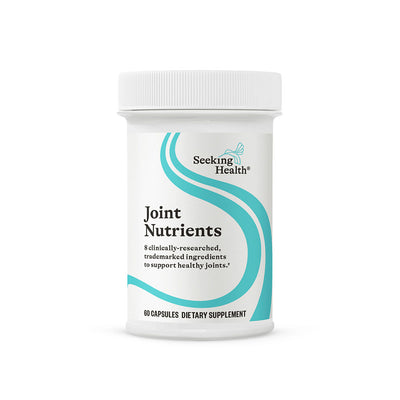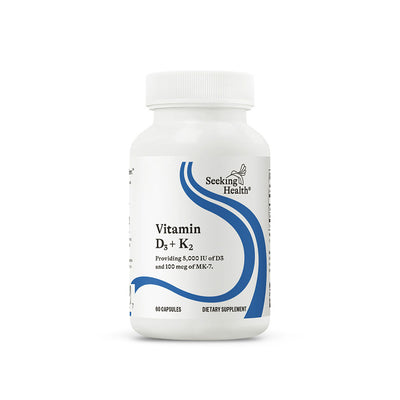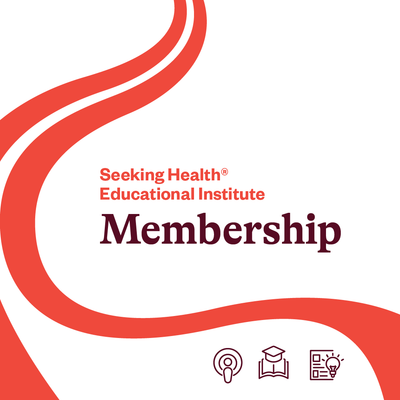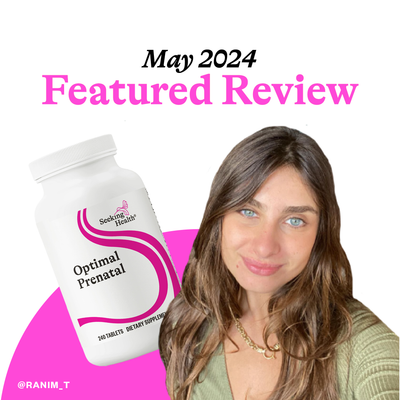Babies need care long before 3 am feedings and finding good daycare — it starts with taking care of yourself first before that special day arrives. If you're planning on becoming pregnant, you most likely will have to take prenatal vitamins to support your good health. Doing so can also help ensure your baby's well-being long before you hold them in your arms and soothe their cries.
Keep reading to learn about these vitamins and their role in your pregnancy and your baby's growth. You'll learn what prenatal vitamins are used for, the different kinds, and if you should take them. You can also learn more about Seeking Health's prenatal vitamins that you can take as part of a healthy, low-risk pregnancy.
What Are Prenatal Vitamins Used For?
Prenatal vitamins are used to help you stay healthy before, during, and after pregnancy. They also support with your baby's health by providing nutrients that contribute to healthy development.
These supplements contain vitamins, minerals, and other nutrients your body needs when bringing a tiny life into the world.†
These unique supplements are also used to treat vitamin deficiencies. They can help you achieve normal blood levels so you are no longer deficient. You'll also be better equipped to support your baby's health and normal development. You can give your baby the best chance of having a strong heartbeat, a well-functioning brain, and ten wiggling fingers and toes if you are healthy and take your prenatal as prescribed.†
The multivitamins you may currently take every day are different than prenatal vitamins.(1) They may not provide everything you need during pregnancy when your body has unique needs. So, your healthcare practitioner may have you switch to a prenatal supplement that offers more nutrients as soon as you mention your desire to conceive.
Prenatal vitamins can help support healthy:(2,3,4)†
- iron levels
- delivery
- labor
- blood sugar levels
- blood pressure and protein levels
- thyroid
They can also help with your baby’s healthy developing in the following areas:(2,3)†
- skin
- respiratory system
- body composition in childhood
- brain and cognition
- ability to focus
- mood
- eyes and vision
- growth
- bone formation
You can talk with your healthcare practitioner to determine which prenatal vitamins are the best to take to support the health of you and your baby.
What Are In Prenatal Vitamins?
Prenatal vitamins have specific combinations of vitamins, minerals, and other nutrients in them. They are formulated to support conception, pregnancy, and your baby’s healthy development.
The three types of prenatal vitamins you may hear most about are folate or folic acid, iron, and calcium. Each has a unique benefit to support your pre- and postnatal health and your baby’s normal development:
| Nutrient | Benefit |
| Folate | Some women may reduce their risk of a neural tube defect pregnancy by maintaining adequate intakes of folate during their childbearing years.(5,6)† |
| Calcium | Calcium supports healthy bone and teeth growth in the baby and may support healthy blood pressure during pregnancy.(2)† |
| Iron | Iron can reduce the risk of iron-deficient anemia if indicated by your doctor, supporting healthy labor, birth, and iron levels in your baby. Taking iron also supports healthy placenta development.(2,5)† |
Additionally, there are other vitamins and nutrients that your healthcare practitioner may suggest taking before, during, and after pregnancy, including:
| Nutrient | Benefit |
| Vitamin B12 | B12 helps with healthy DNA development, cell replication, and gene expression.(3) |
| Vitamin D | Vitamin D supports healthy blood pressure during pregnancy, healthy blood sugar levels and normal birth weight. It also supports healthy delivery and post-birth mood.(2)† |
| Vitamin E | Vitamin E supports healthy blood pressure during pregnancy, healthy membrane and muscle comfort.(2)† |
| Choline | Choline helps develop a healthy brain and nervous system.(2) |
| Omega-3 fatty acids | Omega-3 fatty acids (such as docosahexaenoic acid — DHA) help develop a healthy brain and retinas, especially during the third trimester. It may also support a healthy mood after birth.(2)† |
Who Needs Prenatal Vitamins?

Reproductive-age women who plan on getting pregnant generally need to take prenatal vitamins.(7) Starting them before conception can help protect your baby's health early. For example, a baby's brain and spine start developing in the first month of pregnancy, before you may know you're expecting.†
You may need to take specific prenatal vitamins if you have a health condition or are on a special diet.(8) For example, if you are a vegetarian, you may need to take vitamin B12, zinc, or iron. You may need to take omega-3s and iodine if you're vegan.† Your healthcare practitioner can tell you what supplements suit you best.
Are Prenatal Vitamins Safe?
Most prenatal vitamins are considered safe as long as they are used as prescribed. However, some vitamins, like vitamin A, can be risky even though you need a certain amount for your baby's organ development.(9) Vitamin C is also questionable. If you take too much, the excess may be eliminated through the umbilical cord†, which may be dangerous for your baby. Your healthcare practitioner can discuss the pros and cons of taking vitamins A and C.
Additionally, you may wonder if you can take prenatal vitamins even if you aren't pregnant. The short answer is yes, it's generally safe. They may offer benefits a regular daily multivitamin can't in some cases. Your healthcare practitioner can tell you if you need to take a prenatal vitamin and which one, even if you're not planning on becoming pregnant.
How Long Should You Take Prenatal Vitamins?
You should take prenatal vitamins until your healthcare practitioner tells you to stop. Some women even start taking them long before they get pregnant and well after they deliver, especially if you plan on breastfeeding your baby.(1) Taking prenatal vitamins can help ensure you get the nutrients you need while your hormones are still in flux.†

Seeking Health’s Prenatal Vitamins
If you’re ready to start taking prenatal vitamins, you can check out the prenatal vitamins and supplements Seeking Health has developed to help support you throughout your pregnancy. You can take these supplements from when you first try getting pregnant until after delivery. We’ve also included methyl-sensitive formulas if you experience side effects from taking traditional supplements.
- Prenatal Essentials contain key pregnancy nutrients, including methylated forms of folate, B12, and trimethylglycine (TMG). They support healthy MTHFR, BC01, and GST/GPX genes that are crucial for healthy fertility, pregnancy, and cell division.†
- Prenatal Essentials MF supports healthy immune, spine, and brain development. Prenatal Essentials MF contains B12 and folate in bioavailable, methyl-free forms to support optimal methylation.†
- Optimal Prenatal MF is a high-strength, first-of-its-kind non-methylated prenatal supplement containing a blend of amino acids, chelated minerals, and bioavailable B vitamins to support a healthy pregnancy.†
None of the supplements in our prenatal collection contain iron. This allows you to customize your iron intake as your healthcare practitioner advises which may be more gentle on your body.
The Bottom Line
The responsibility of caring for a baby begins long before birth. It starts with how you treat your body and what you put into it when your baby is just a glimmer in your eye.
Taking prenatal vitamins can help you ensure you remain healthy throughout your pregnancy. They can also help give your baby a good start by supporting their development.†
You and your healthcare practitioner can decide which vitamins are best suited to you. These supplements are safe; you can take them after delivery to support your health during breastfeeding. Seeking Health makes finding the right prenatal vitamins easy. We offer several options so you can find what you need to start focusing on the joy parenthood should bring.
References
- https://www.marchofdimes.org/find-support/topics/pregnancy/vitamins-and-other-nutrients-during-pregnancy
- https://pubmed.ncbi.nlm.nih.gov/34684531/
- https://pubmed.ncbi.nlm.nih.gov/35818085/
- https://pubmed.ncbi.nlm.nih.gov/34071548/
- https://pubmed.ncbi.nlm.nih.gov/32127134/
- https://pubmed.ncbi.nlm.nih.gov/26272218/
- https://www.mayoclinic.org/healthy-lifestyle/pregnancy-week-by-week/in-depth/prenatal-vitamins/art-20046945#:~:text=In%20fact%2C%20it's%20generally%20a,know%20that%20you're%20pregnant.
- https://pubmed.ncbi.nlm.nih.gov/31925443/
- https://pubmed.ncbi.nlm.nih.gov/30019973/
† These statements have not been evaluated by the Food and Drug Administration (FDA). This product is not intended to diagnose, treat, cure, or prevent any disease.












